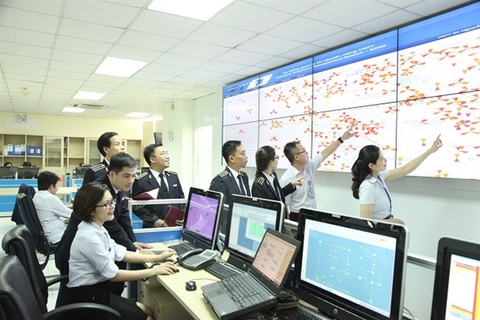
IT has helped improve effectiveness of audit activities. — Photo chutich.aosai14.vn
The application of new and modern technologies into auditing has brought significant changes and improved the effectiveness of the activities, according to the State Audit of Viet Nam (SAV).
As the wave of technology has strongly penetrated sectors which are subject to auditing activities, it is vital to update new technology trends to apply to the audit. Technology has become an important tool in enhancing audit effectiveness.
SAV’s auditors have applied software in the audit of land planning and management in urban areas which were complicated as well as compensation and support for resettlement when implementing projects.
For example, the Global Mapper and Map Tiler software have helped auditors read and analyse numerical data on land use planning maps, determine boundaries of land plots and actual land status compared with land use planning. The software has helped them save time and increase accuracy.
In addition, when applying software to pair the planning map to the digital map system with GPS positioning, it will help auditors accurately determine the planned land location in the area, thereby detecting false cases.
Thanks to the technologies, the audit delegation in Region XII discovered 87 areas which are not matched between planning and reality, with total areas of more than 325ha in Pleiku City in the Central Highlands province of Gia Lai.
Auditor Nguyen Thi Thanh Loan who directly participated in building credit rating software for banks said after applying the software, it is easier for auditors in inspecting the accuracy of debt classification, clarifying risk prevention costs and eliminating risks in auditing. The software also helps auditors unify the method and process the audit data when performing a single operation audit for many branches of a bank.
In addition to IT application into audit activities, SAV has also used other advanced technologies which are showing positive results. Of which, the application of remote sensing technology to mineral mining audits in northern Hai Phong Port City’s Thuy Nguyen District has been a testament to the impacts of new technologies on audit efficiency.
According to SAV’s Chief Inspector, Duong Quang Chinh, currently, the natural resource tax is collected based on the output of the exploited amount. This causes a great disadvantage as the nature of the tax must be collected based on the natural resource stock.
This is the reason that there are losses in natural resources as businesses often choose locations with favourable conditions for exploitation to reduce costs. In addition, with the management based solely on the exploited output while there is no effective method of managing exploitation output, the State has lost trillions of Vietnamese dong in natural resource tax.
The application of remote sensing technology in the mineral exploitation audit has helped increase tax collection.
Chinh said by using calculation results of the technology, SAV has prevented risks of illegal exploitation which causes natural resource losses and destroys the environment.
He added that SAV should choose suitable technologies and complete a legal foundation for each audit sector.
Nguyen Thi Thanh Loan said it is necessary to have human resources who are both knowledgeable in audit and IT to be able to co-ordinate with technology experts, thus increasing the initiative in the audit process. SAV has been actively promoting training and supplementing IT-knowledgeable auditors while enhancing investment in developing software tools to support auditors.
The State Auditor General has approved SAV’s IT development strategy and overall architecture for the 2019-25 period, with a vision to 2030. The strategy identifies an appropriate roadmap to move the traditional audit process to a digital one by using Big Data, artificial intelligence (AI) and internet of things (IoT).
By applying achievements in science and technology into audit activities, SAV has shown its pioneering role in the position of chair of the Asian Organisation of Supreme Audit Institutions in 2018-21. — VNS